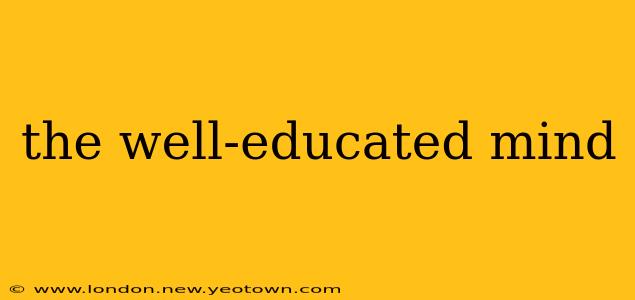The phrase "well-educated mind" conjures different images for different people. Some might picture a mind overflowing with facts and figures, capable of reciting historical dates or solving complex equations. Others might envision a mind brimming with creativity, capable of innovative thinking and insightful analysis. The truth is, a well-educated mind encompasses both – and so much more. It's a journey, not a destination, a continuous process of growth and understanding. This journey isn't just about accumulating knowledge; it's about cultivating critical thinking, fostering empathy, and developing a lifelong love of learning.
What Makes a Mind Truly Well-Educated?
A truly well-educated mind isn't defined by the number of degrees earned or the prestige of the institutions attended. It's characterized by a unique blend of intellectual abilities and personal qualities. Let's explore some key attributes:
1. Critical Thinking Skills: Can a well-educated mind blindly accept information? Absolutely not! A well-educated mind questions assumptions, analyzes evidence, and forms reasoned judgments. It's capable of identifying biases, spotting fallacies, and evaluating the credibility of sources. This isn't about cynicism, but about thoughtful discernment.
2. Adaptability and Lifelong Learning: The world is constantly changing. A well-educated mind embraces this change, recognizing the need for continuous learning and adaptation. It's curious, seeking out new knowledge and experiences, and readily adjusting to new situations and challenges. This involves a thirst for knowledge that extends far beyond formal education.
3. Effective Communication Skills: Knowledge is useless if it can't be shared. A well-educated mind is capable of articulating its thoughts clearly and persuasively, both verbally and in writing. It can effectively communicate complex ideas to diverse audiences, adapting its communication style to suit the context.
4. Problem-Solving Abilities: The world throws curveballs. A well-educated mind approaches challenges with a methodical and resourceful mindset. It identifies problems, analyzes causes, explores potential solutions, and evaluates outcomes. This involves a blend of creativity and logic.
5. Empathy and Understanding: Education isn't solely about intellectual pursuits; it's also about understanding the world and the people within it. A well-educated mind cultivates empathy, seeking to understand different perspectives and experiences. It recognizes the importance of cultural sensitivity and social responsibility.
Is a College Degree Necessary for a Well-Educated Mind?
This is a common question. While a college degree can provide structured learning and access to resources, it's not the sole path to a well-educated mind. Many individuals have cultivated exceptional intellectual abilities and personal qualities through diverse avenues – self-study, apprenticeships, travel, and real-world experiences. The key is a commitment to continuous learning and a desire to expand one's horizons.
How Can I Cultivate a Well-Educated Mind?
The journey to a well-educated mind is a personal one. It requires dedication, curiosity, and a willingness to embrace challenges. Here are some actionable steps:
- Read widely and deeply: Explore diverse subjects, from fiction to non-fiction, expanding your understanding of the world and different perspectives.
- Engage in critical discussions: Share ideas, debate viewpoints, and challenge your assumptions.
- Seek out diverse experiences: Travel, volunteer, and engage with people from different backgrounds.
- Embrace failure as a learning opportunity: Don't be afraid to make mistakes; learn from them and grow.
- Develop a growth mindset: Believe in your ability to learn and improve.
The well-educated mind is a powerful asset, not only for personal fulfillment but also for contributing meaningfully to society. It's a journey of continuous learning, critical thinking, and personal growth. Embark on this journey with curiosity and determination, and the rewards will be immeasurable.

